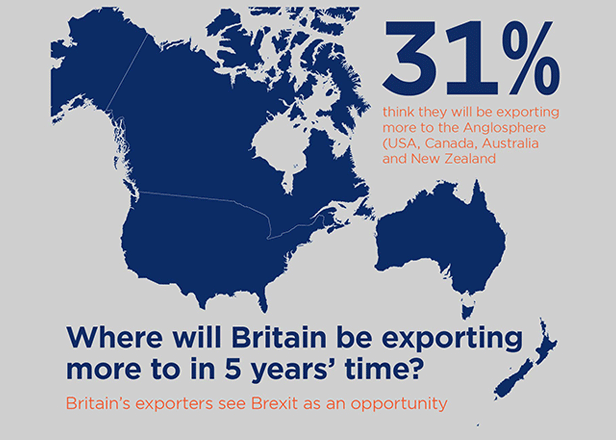September 14, 2018 Opinion piece
 Gary Lynch, CEO of GS1 UK, looks at what the future holds for British businesses, in light of Brexit and the rise of protectionism globally
Gary Lynch, CEO of GS1 UK, looks at what the future holds for British businesses, in light of Brexit and the rise of protectionism globally
It’s been 200 years since David Ricardo first made the case for free trade in On Principles of Political Economy and Taxation. Where Ricardo talked the talk, GS1 walks the walk. As an organisation, we have been facilitating cross-border trade across the globe for over 40 years. Yet it’s only with the advent of the internet that the world has been truly connected. With the rapid progress of technology and innovation, the revolution in exporting is only just beginning. GS1 UK recently surveyed more than 1,000 British businesses from our membership to see how Britain’s trade with the rest of the world will change during this pivotal time. We’ve outlined six of the top trends in exporting which we think will increase over the next five years.
 More trade and fresh optimism
More trade and fresh optimism
Despite some political hurdles, including Brexit and Donald Trump’s apparent move towards greater protectionism, British exporters are optimistic. Almost three-quarters of the businesses we spoke to said they expect their cross-border trade to increase over the next five years. This optimism is not unfounded. The CBIfound that export order books have risen to the highest level in over three years, while expectations for growth are at a more than two-decade high. At the end of last year, the ONS also reported that exports were at a record high. While the UK will retain a balance of trade deficit for the foreseeable future, we should still export more than ever before.
Stronger relationships with old partners
With Britain seemingly on the path to leaving the EU’s customs union, we will be able to negotiate new trade deals with the rest of the world. Our research showed UK businesses are keen to get going, with 54% believing Britain’s future lies outside the EU. Some of the first nations to signal their interest were our fellow English speaking nations: Australia, Canada, New Zealand and the U.S. Back in 2015, these nations received just over a fifth of our exports, but this looks set to rise as nearly a third of the exporters we surveyed thought they’d be selling more into these countries in five years’ time when we are outside the EU.

New firms making traditional products
We’ve recently witnessed a boom in buying British as consumers look for products with authentic British provenance. While many of these goods have already hit the shelves of our own supermarkets, many more are set to be sold overseas. There has been a surge in small UK businesses making heritage products to sell around the world, with foreign buyers eager to get taste of British beer and Scottish Whisky. As we seek to become a ‘Global Britain’ after leaving the EU, the products which celebrate our heritage will lead the way.
New digital merchants helping to bring niche products to market
As technology leaps forward, we’ve noticed a new kind of trader on the global stage. With the rise of e-commerce, new digital merchants have arrived. These businesses source products from manufactures around the world to sell through their own websites. Some of the most successful examples include Net-A-Porter and the Whisky Exchange. With the growth of these merchants, specialist producers have found global markets for niche products. As digital merchants scour the world for the finest goods to sell to their customers, skilled, small businesses in developing nations will be able to sell their products much more easily around the world.
 Online marketplaces will be the home of global trade
Online marketplaces will be the home of global trade
While specialist digital merchants will increase their trade, the biggest growth will come from the e-commerce giants. Twenty years ago Alibaba didn’t exist. Now it’s the world’s largest retailer, surpassing Walmart in 2014. These online marketplaces, which also include Amazon, Google Shopping and eBay, have democratised retail as even the smallest businesses can sell through their sites, using GS1 standards of course. This means firms no longer have to win the support of major multinationals to bring their products to market. The platforms have allowed exporters access to new markets without requiring new distributers or foreign websites. Royal Mail recently opened a channel on Alibaba to provide an easy entry point for small British exporters into China. When we polled British businesses, over half (53%) of our members thought they would do more business through online marketplaces in the next five years, while only 3% said they would be using them less.